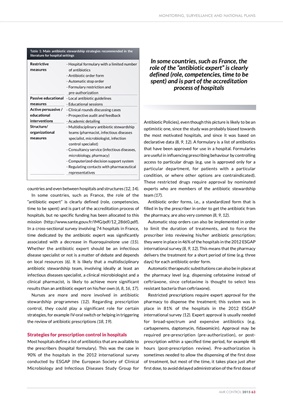
countries and even between hospitals and structures (12, 14).
In some countries, such as France, the role of the
"antibiotic expert" is clearly defined (role, competencies,
time to be spent) and is part of the accreditation process of
hospitals, but no specific funding has been allocated to this
mission (http://www.sante.gouv.fr/img/pdf/12_286t0.pdf).
In a cross-sectional survey involving 74 hospitals in France,
time dedicated by the antibiotic expert was significantly
associated with a decrease in fluoroquinolone use (15).
Whether the antibiotic expert should be an infectious
disease specialist or not is a matter of debate and depends
on local resources (6). It is likely that a multidisciplinary
antibiotic stewardship team, involving ideally at least an
infectious diseases specialist, a clinical microbiologist and a
clinical pharmacist, is likely to achieve more significant
results than an antibiotic expert on his/her own (6, 8, 16, 17).
Nurses are more and more involved in antibiotic
stewardship programmes (12). Regarding prescription
control, they could play a significant role for certain
strategies, for example IV-oral switch or helping in triggering
the review of antibiotic prescriptions (18, 19).
Strategies for prescription control in hospitals
Most hospitals define a list of antibiotics that are available to
the prescribers (hospital formulary). This was the case in
90% of the hospitals in the 2012 international survey
conducted by ESGAP (the European Society of Clinical
Microbiology and Infectious Diseases Study Group for
Antibiotic Policies), even though this picture is likely to be an
optimistic one, since the study was probably biased towards
the most motivated hospitals, and since it was based on
declarative data (8, 9, 12). A formulary is a list of antibiotics
that have been approved for use in a hospital. Formularies
are useful in influencing prescribing behaviour by controlling
access to particular drugs (e.g. use is approved only for a
particular department, for patients with a particular
condition, or where other options are contraindicated).
These restricted drugs require approval by nominated
experts who are members of the antibiotic stewardship
team (17).
Antibiotic order forms, i.e., a standardized form that is
filled in by the prescriber in order to get the antibiotic from
the pharmacy, are also very common (8, 9, 12).
Automatic stop orders can also be implemented in order
to limit the duration of treatments, and to force the
prescriber into reviewing his/her antibiotic prescription;
they were in place in 46% of the hospitals in the 2012 ESGAP
international survey (8, 9, 12). This means that the pharmacy
delivers the treatment for a short period of time (e.g. three
days) for each antibiotic order form.
Automatic therapeutic substitutions can also be in place at
the pharmacy level (e.g. dispensing cefotaxime instead of
ceftriaxone, since cefotaxime is thought to select less
resistant bacteria than ceftriaxone).
Restricted prescriptions require expert approval for the
pharmacy to dispense the treatment; this system was in
place in 81% of the hospitals in the 2012 ESGAP
international survey (12). Expert approval is usually needed
for broad-spectrum and expensive antibiotics (e.g.
carbapenems, daptomycin, fidaxomicin). Approval may be
required pre-prescription (pre-authorization), or postprescription
within a specified time period, for example 48
hours (post-prescription review). Pre-authorization is
sometimes needed to allow the dispensing of the first dose
of treatment, but most of the time, it takes place just after
first dose, to avoid delayed administration of the first dose of
MONITORING, SURVEILLANCE AND NATIONAL PLANS
AMR CONTROL 2015 63
Table 1: Main antibiotic stewardship strategies recommended in the
literature for hospital settings
Restrictive
measures
Passive educational
measures
Active persuasive /
educational
interventions
Structure/
organizational
measures
- Hospital formulary with a limited number
of antibiotics
- Antibiotic order form
- Automatic stop order
- Formulary restriction and
pre-authorization
- Local antibiotic guidelines
- Educational sessions
- Clinical rounds discussing cases
- Prospective audit and feedback
- Academic detailing
- Multidisciplinary antibiotic stewardship
teams (pharmacist, infectious diseases
specialist, microbiologist, infection
control specialist)
- Consultancy service (infectious diseases,
microbiology, pharmacy)
- Computerized-decision support system
- Regulating contacts with pharmaceutical
representatives
In some countries, such as France, the
role of the "antibiotic expert" is clearly
defined (role, competencies, time to be
spent) and is part of the accreditation
process of hospitals